A course of study and life between Lithuania, the Netherlands and Italy driven by her interest in food, music, art and culture, intertwining these themes and identifying their impact on society: this is, in brief, the path pursued by Rimvydė Muzikevičiūtė, a 26-year-old Lithuanian student now fully immersed in the project Let Eat Bi to evaluate if and how a cultural initiative based on art can lead the subjects involved to act for a sustainable change. We met with her to share part of her investigation in the place where she has chosen to shape and advance her research, Cittadellarte. Although Rimvydė has only been in Biella since last October, it felt like she was completely at ease in the environment of Fondazione Pistoletto, as if she had been involved in all its aspects for years. From the very start of our conversation, she appeared enthusiastic to share her story and, step by step, it became clear what had brought her here. In a narrative dotted with contagious smiles and conveying an incredible creative energy, she outlined what is behind her choice of developing a seemingly unusual idea for her course of studies: identifying and defining how sustainability and food are common goods and part of the culture of a specific geo-social context.

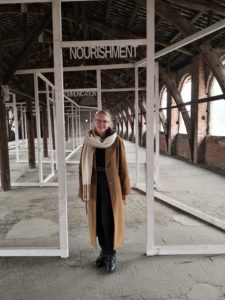
Her idea might have sounded a bit like colouring outside the lines: the two-year research in cultural leadership she is conducting at Groningen focuses on the key words ‘art’ and ‘culture’, and – as she herself told us – her university classmates have tended to investigate aspects more closely linked to these two subjects, without straying. “For my two-year course,” she explained, “I had to do an internship on a topic of my choice. At the beginning of my master’s course I was already interested in sustainability and food as common goods and as part of a culture. Students from my course generally choose to do their internships in museums, festivals or other institutions usually associated with culture, whereas I wanted to focus on food, linking it to the themes of my master’s course. I was concerned that my proposal wouldn’t be fully understood, but Katherine Watson (director of the ‘Cultural Leader in Residence’ programme at the University of Groningen), who knows Cittadellarte, suggested that I should consider the place, and specifically its Food Office. Let Eat Bi represented everything I had imagined! So I decided to go for it: the association would be inspirational and functional for my research work”.
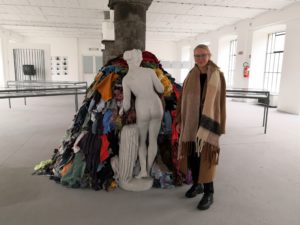

The passion for the theme of food and the experience of living in our country are not new to the student: she lived in Trento for almost four years while attending a three-year course at the Trento and Riva del Garda Conservatory “F. A. Bonporti”. Here, among scores and notes, she started fostering her interest in food: “During this educational experience,” she said to us, “I had the chance to learn the language and familiarise myself with Italian and international cultures thanks to moments of conviviality with other students. Dinners would also be opportunities to congregate: on the suggestion of our sax professor, each of us – including him – would bring a dish typical of their country and share it with the others. These were occasions that strengthened the sense of community, everybody shared their world through food; I have also always liked discovering new recipes. I understood at that time that food defines a specific culture and society, and I have therefore decided to make this theme my field of study”. This desire is also the result of her upbringing: as a child she would always eat local, organic and seasonal food grown in her family’s garden in Lithuania.
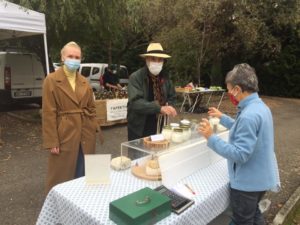
This desire has then developed and taken shape in Biella, where she has felt welcomed since day one: “I find that the Netherlands have a more individualistic culture than Italy,” she said, “where the sense of community is stronger, as my experiences in Trento and at Cittadellarte show. When I arrived here, I straight away went to the Let Eat Bi market and met Armona Pistoletto and the producers running the various stalls, and Mario Lombardi with the volunteers of the project ‘Orti del Biellese’. Soon after, I visited and worked in one of these plots of land. I could immediately immerse myself in the association, studying from up close all the activities centred on Let Eat Bi”. On the basis of her experience at Cittadellarte, Rimvydė is required to create a framework for her research and, as the objective of her two-year course, she must develop a policy advice aimed at supporting the organisation of reference.
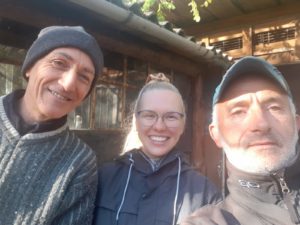
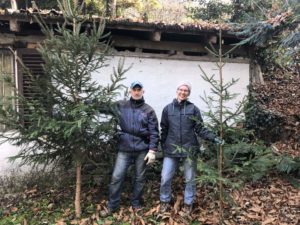
“In addition to the farmers’ market,” she continued, “I also assist Armona with applications for contributions, and I carry out surveys among both suppliers and customers of the market. When I have gathered all the material, I will compile a report aimed at giving suggestions on how to develop the project Let Eat Bi, the final step will be to write my dissertation”. An articulated process that relies on the contribution and analysis of producers and consumers, and on the observation of all the key moments of the association’s activities, i.e. initiatives and events, and the meetings of the board of directors. The student noticed in particular the process of exchange of information: “It is very important for consumers to be able to meet and talk with the producers. In the Netherlands, where I live, they don’t have this opportunity: we only have big markets and, unlike at the Let Eat Bi market, you can’t have ‘relationships’ establishing between producers and consumers”.

For Rimvydė, Let Eat Bi is a virtuous model in all its aspects. Can it be emulated in other contexts though? “I will be in a position to fully answer this question once I have concluded my research, but a practice like this is very much defined by its cultural and social environment. I think it might be difficult to replicate in the Netherlands, for example, as food is not socially considered a primary topic in terms of time and resources. A responsible change could more effectively occur in communities that understand the importance of promoting social responsibility and more sustainable practices”. With this in mind, Rimvydė concluded by highlighting the differences between Italy and the Netherlands, emphasising the commendable peculiarity of Cittadellarte’s market: “Let Eat Bi offers the opportunity to buy healthy and organic products at an affordable price, whereas in most Dutch cities shops selling quality fruit and vegetables are too expensive. Not only that: at Cittadellarte’s market I have discovered how much variety, also of colours, there is in vegetables. It might seem like an irrelevant detail, but I was surprised by how many types of cauliflowers, herbs and salads exist. All this represents a priceless treasure of which we are often not aware”.

